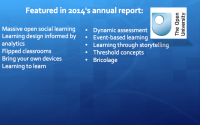
Lessons Learned: Effectiveness of Synchronous Full-Distance Delivery for Aboriginal Teacher
Recent Ontario provincial and federal education policy developments propose to increase the academic success of an ever increasing number of First Nation children attending urban and First Nation schools. Key to achieving that goal is increasing the number of Aboriginal educators who are skilled in teaching that is grounded in culturally responsive and relational pedagogy. […]















